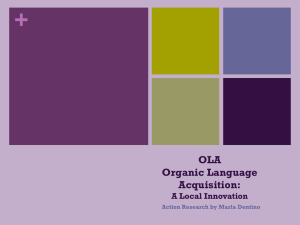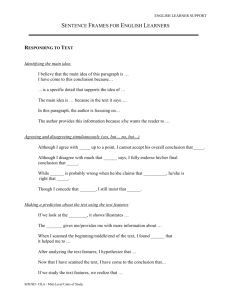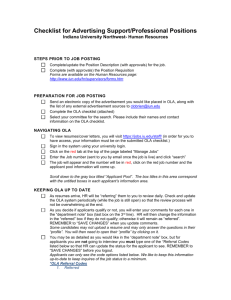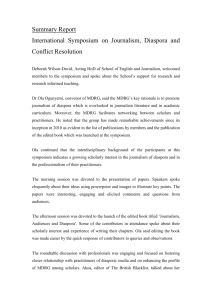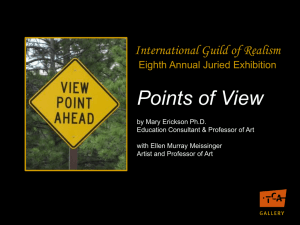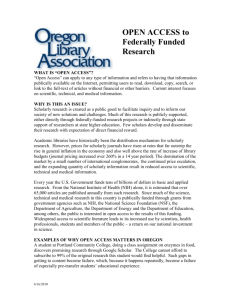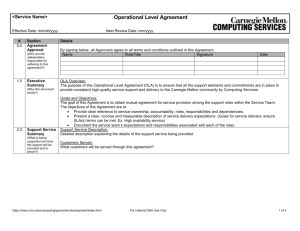Inside Out: Library Services at Point of Need
advertisement
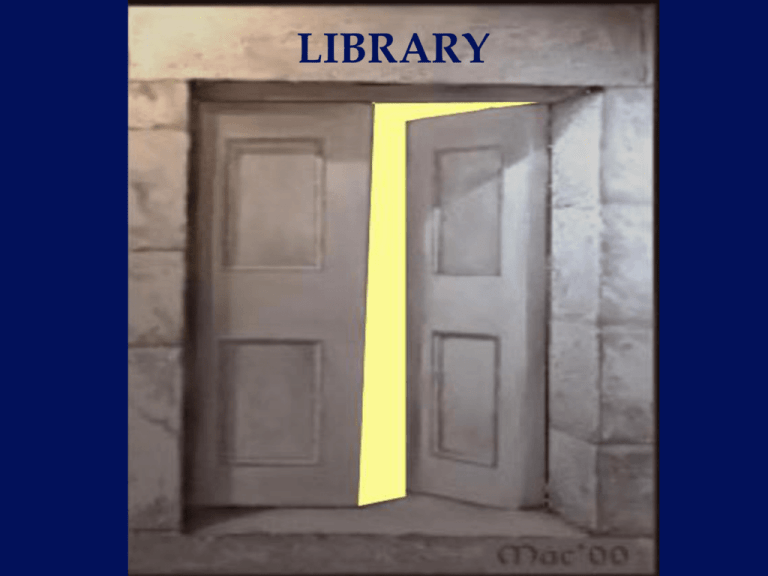
LIBRARY Inside Out: Library Services at Point of Need Sharon Munro, University of Windsor Sophie Bury, York University Ilo-Katryn Maimets, York University OLA 2008 Session Outline Key Questions What are the needs of faculty and students – what do we know about their knowledge, experience and skills? What difference can we make and how? Reference Research Information Literacy Theory, practice and case studies Learning from each other OLA 2008 Assessing Needs Examples from the literature User needs assessment Focus groups Surveys Pre-test/post-test OLA 2008 What are the needs? “…Librarians are dedicated to maintaining the importance and relevance of the academic library as a place of intellectual stimulation and a center of activity on campus. Even so, some feel that libraries are becoming marginalized. …We must find ways to promote the values, expertise and leadership of the profession throughout the campus to ensure appreciation for the roles librarians can and do play. Though access to information is becoming increasingly decentralized and computer labs now compete with libraries as campus gathering points, librarians must demonstrate to the campus community that the library remains central to academic effort.” Hisle, W. Lee (2002) Top issues facing academic libraries: a report of the Focus on the Future Task Force. College & Research Libraries News, 63 (10), pp. 715. OLA 2008 What are the needs? “Let’s face it: not only do many faculty members not think of the library as the heart of the college, but we seem to be more like the kidneys – often ignored when we’re around but missed when significantly compromised or removed.” Rabinowitz, Celia E. (2003). Moving beyond the “Re” generation: making libraries and librarians count in the twenty-first century. In Martin H. Raish (ed.), Musings, meanderings, and monsters, too: essays on academic librarianship. Lanham, Md: The Scarecrow Press, pp. 23. OLA 2008 What are the needs? “…observing faculty in their offices as they interacted with our electronic resources, outreach reference librarians noted that faculty would habitually execute the same keyword search across different databases without taking advantage of controlled language searching through thesauri. In addition, faculty seemed to be unaware of the advantage of using proximity operators in searching full text databases.” Cruickshank, John, & Nowak, David G. (2001) Marketing reference resources and services through a university outreach program. The Reference Librarian, 73, pp. 271. OLA 2008 What are the needs? - Evidence “…The survey findings indicate that 89 percent of college student information searches begin with a search engine… Library Web sites were selected by just 2 percent of students as the source used to begin an information search.” OCLC (2006). College students’ perceptions of libraries and information resources – Part 1, pp. 1-7. www.oclc.org/reports/pdfs/studentperceptions.pdf OLA 2008 What are the needs? - Evidence “Fifty-four percent of college students do not seek assistance when using library electronic resources, while 64 percent of total respondents report they have not sought help when using the library’s electronic resources.” OCLC (2006). College students’ perceptions of library and information resources - Part 2, pp. 2-6. OLA 2008 What are the needs? - Evidence “…Although usage of many of the library electronic resources is relatively low, respondents indicated that the information provided is worthwhile. While only 8 percent of college student respondents have used an online librarian question service, 64 percent of the college students who used this service completely agree or agree this service provides worthwhile information.” OCLC (2006). College students’ perceptions of library and information resources - Part 1, pp. 1-14. OLA 2008 What are the needs? - Evidence “My schedule rarely fits their schedule.” 21-year-old undergraduate from the United States OCLC (2005). Perceptions of libraries and information resources - question 812b, “Please list two negative associations with the library”. OLA 2008 What are the needs? - Evidence “Just remember that students are less informed about the resources of the library than ever before because they are competing heavily with the Internet.” 20-year-old undergraduate from the United States OCLC (2005). Perceptions of libraries and information resources - question 1240, “If you could provide one piece of advice to your library, what would it be?” OLA 2008 What are the needs? - Evidence “…Libraries will continue to share an expanding infosphere with an increasing number of content producers, providers and consumers. Information consumers will continue to self-serve from a growing information smorgasbord. The challenge for libraries is to clearly define and market their relevant place in that infosphere – their services and collections both physical and virtual.” OCLC (2006). College students’ perceptions of library and information resources - Part 6, pp. 6-6. OLA 2008 Outreach - planning and preparation “Before implementing outreach programs, librarians should analyze, or review, user needs, campus context, and available resources.” Westbrook, Lynn, & Waldman, Robert (1993) Outreach in Academic Libraries: Principle into Practice. Research Strategies,11 (2), pp. 61. OLA 2008 User Needs Assessment Conducted at York University Libraries Graduate students Survey Focus groups Goal of gathering information about: Research habits Awareness / experiences / perceptions reference IL services web-based guides and tutorials Recommendations and advice on how reference, IL, and web-based guides and tutorials should be enhanced at York OLA 2008 Survey Survey of Graduate Students Online survey: Survey Monkey Sent to all graduate program directors for distribution to graduate student mailing lists on campus in October 2007 193 completed responses (60.9% Masters; 39.1% Doctorate) Total response rate was 5% OLA 2008 Focus groups Graduate Student Focus Groups Five focus groups Two at Scott Library - Social Sciences, Humanities, Environmental Studies, Education, Fine Arts - October 2007 Two at Steacie Science & Engineering Library - October 2007 Two at Bronfman Business Library (MBAs) – May 2005 Volunteers sought through e-mail (graduate student listservs) and through graduate student classes, workshops and TA events Participants in focus groups 18 at Scott Library 13 at Steacie Science and Engineering Library 11 at Bronfman Business Library OLA 2008 Survey Resources Used for Research Survey Frequency of research activities Focus groups Challenges with research Focusing the search – frustrations Challenges of navigating the Library web site Lack of awareness of: Web-based subject research guides Especially Science and Business Relevant databases for their discipline Especially Science and Business Unfocused results / too much reading Multiple database interfaces “we waste too much time when we don’t know the tricks” and need Time-saving shortcuts Effective search tips OLA 2008 Survey Awareness of library services Survey Usage of library services Survey Accessing librarian services Survey Resources - Professor input Survey Services - Professor input Focus groups Research - Professor input “Professors do not give a lot of guidance on approaching research” Faculty appear to expect them to have skills already Students say they lack skills Or to expect them to know how to teach themselves Any guidance given involves: specific journals/ authors/ references resources relevant to specific research projects/tasks No guidance on searching / finding relevant library resources / services Students want more guidance! OLA 2008 Focus groups Student recommendations Outreach to faculty Increased communication of librarians with faculty Faculty and librarian collaboration on assignments to combine research process with subject content Professors themselves need help to develop their own research skills and knowledge of library resources and services. This may explain the lack of referral to library services. OLA 2008 Focus groups Student recommendations Promoting Awareness of Workshops/Classes E-mail is preferred - listserv was requested Posters in the Libraries, academic departments and high traffic areas / hang-outs Raise profile for workshops and classes on Library home page Raise awareness of names and responsibilities of subject librarians OLA 2008 Focus groups Student recommendations Workshops/Classes: Content/Format Need workshops to accommodate Multiple skill levels Varying knowledge requirements Types of workshops: Generic/introductory Subject specific (program related) Advanced/customized workshops - mentioned themes covered by library specialized workshops e.g. RSS feeds, digital copyright, and Google Scholar Writing / presentation skills / etc OLA 2008 Focus groups Graduate students -Important issues Campus partnerships needed for supporting student research: Campus-wide collaborations with relevant learning support services: Writing centres, Computing services, Faculty of Graduate Studies How to research and write papers: Changed expectations in graduate programs Guidance needed to meet expectations Better access to online writing guides How to make effective presentations (including conference presentations) How to submit papers for publication and conferences Grant writing OLA 2008 Making a Difference Examples from the literature Case studies Off-site reference/IL services in person – University of Windsor Off-site reference/IL services online – University York Nursing Evaluation of learning outcomes in curriculum integrated IL initiative – York University Nursing and Social work Biology Pre-test / post-test OLA 2008 What difference can we make? Inside the classroom, Outside the library Librarians as proactive and innovative partners Meeting users at their “point of need” Curriculum integration vital to teaching, learning and research Ongoing evaluation informs change OLA 2008 Off-site Reference/IL “For years, the focus has been to draw people into libraries. Libraries’ holdings have been moved to offsite locations, and student services have been brought into our buildings as information commons become more popular and ensure bodies passing through gate counters. Longer visits have been encouraged with cafes. Still, this isn’t enough. A different tack is needed. Instead of pulling people in, librarians need to reach outward to become an integral part of the routine interactions of faculty and students.” Ramsay, Karen M., & Kinnie, Jim (2006) The embedded librarian. Library Journal, 131 (6), pp. 34. OLA 2008 Off-site Reference/IL “Students may be reluctant to ask questions at a library reference desk because it is such a public venue. It may be possible to give them an alternative by providing reference service outside of the library within a faculty lab or office. Advantages include convenience and proximity to students, faculty and their learning communities. The service may also foster closer and stronger relationships within departments. It is important to choose a location wisely, as well as advertise widely.” Lee, Jennifer, Hayden, K. Alix, & MacMillan, Don (2004) “I wouldn’t have asked for help if I had to go to the library”: reference services on site. Issues in Science and Technology Librarianship, 41 (Fall). Retrieved online: www.istl.org/04-fall/article2.html OLA 2008 Off-site Reference/IL “…The relationships created through the interactions of library staff with students in the informal environment of the Eta Kappa Nu (HKN) lounge has provided contact with students that do not ordinarily come into the engineering library and in some cases, lasting contacts with a few students of Purdue University. These positive interactions have shown that this service enhances the experience of library patrons.” Nelson, Megan S. (2007) Initiating engineering outreach reference services: background and practice. Reference Services Review,35 (2), pp. 283. OLA 2008 Nursing and Social Work at Windsor Set up office space in a high profile area within the department and ADVERTISE Choose days and times when student traffic will be high Check in with faculty about their research projects and keep them apprised of new library resources Check in with support staff Connect with representatives of relevant student associations OLA 2008 Nursing and Social Work at Windsor Get a web page for the library on the department’s web site Include information about library resources on departmental bulletin boards Get involved with faculty council meetings for your departments Hold workshops for faculty OLA 2008 Nursing and Social Work at Windsor Partner with faculty to write research papers Attend conference and research sessions organized by your departments Develop ties with relevant professional organizations, e.g., the Ontario Association of Social Workers Integrate information literacy into the curriculum OLA 2008 Nursing at York Introduction to IL Presentations at Retreats and New Faculty Teaching at York (NFTY) seminars Curriculum Committee School of Nursing Council Language included strategically UPR Library statements OCGS Library statements Discussions with external reviewers OLA 2008 Nursing at York Undergraduate Level: Factors for success: Most important is program director’s interest Individual faculty buy-in also important MScN online program: Library presence a must in wholly online program E-learning librarian input in creation of an integrated library module during migration from WebCT to Moodle Instructional video clips integrated for ‘point of need’ assistance OLA 2008 Nursing at York Mandatory IL assignment in 3rd year Internationally Educated Nursing Post-RN program (IEN) Collaborative program 2nd entry program Integration most successful into IEN program 3 in-class library sessions Assignment-driven skills acquisition Marks given for process OLA 2008 General instructional video clips Catalogue Workshops walk the viewer through the steps of logging into the York Library website, and using the Library Catalogue for finding books, journals and other library items such as databases and online resources. Accessing e-Resources from Home Searching the Library Catalogue Setting Limits Reserves – short term loans Databases at York RACER- Document Delivery OLA 2008 Nursing instructional video clips Searching and refining searches in CINAHL(Ovid) and MEDLINE(Ovid) Subject Headings - Single Search Subject Headings - Combining Searches Keyword Searching Combining Subject Heading Searches with Keyword searches Setting Limits - date ranges, journal sets, publication types, etc. Finding Full Text Articles Results Manager - Save search results and send them to RefWorks OLA 2008 Lessons Online Lessons teach the principles behind searching. contain definitions and more detail about the processes they address. Developing a Search Strategy: This lesson is the precursor to Keyword Searching, and Subject Heading Searching. It describes the use of the Boolean Operators AND and OR as well as Truncation and troubleshooting to optimize results. Subject Heading Searches and Keyword Searches: This lesson contains a glossary of terms and clarifies the differences between subject heading and keyword searching DEMO OLA 2008 Biology at York - History Several years of one-offs in specialized upper level courses and graduate program A few very supportive faculty Ecology (2ndyr, 4thyr and grad level) Immunobiology Microbiology Large first-year classes 1200+ students OLA 2008 Dialogue begins Summer 2007 Abysmal quality of writing and referencing Lack of understanding of the research process OLA 2008 SC/BIOL 3100 Current Topics in Biology ‘Gateway' course for 3rd year honours biology students Designed to prepare them for the 4th year honours thesis Major aim to teach the research and writing skills to students, at a level appropriate for an upper-year course “I am sick and tired of citations from the 1st year biology textbook and Wikipedia!” OLA 2008 Desired Outcomes 1. How to search for and evaluate relevant primary, secondary and tertiary literature as well as grey literature – government reports etc. 2. How to read and interpret research articles 3. How to properly write a research paper 4. How to properly give a research seminar OLA 2008 Skills Needed for Research: Learn how the scientific method is related to the research process as well as the publication cycle in Science Acquire expertise in the use of tools and resources in the chosen subject area Develop sound research, evaluation and critical thinking skills OLA 2008 Ultimate Goal: To be able to participate in the research culture of the University and the science community at large Science research is enhanced when students: Know what research has been done, and where the gaps are in the existing literature Who is doing good work How they do it, what tools are they using How research is evaluated OLA 2008 Framework Outlined list of objectives for each session and related outcomes for the assignments Designed collaborative assignments that coupled content with process Pre-test/Post-test/evaluation Student evaluation of the course content OLA 2008 Tying Science Literacy to Information Literacy Scientific Method - Research Publication Cycle Grey literature vs. Popular literature Primary / Research Secondary / Review Tertiary / Accepted theory, data, etc Indexing and databases Resources and access Formal peer review vs. Informal evaluation Reading papers and Writing annotations OLA 2008 Biology 3100 - assignments Assignments In-class exercises – first and last class 1. Comparing publication types 2. Reading for information – what and how to read, writing annotations – questions to ask Take Home assignments focused on topic development through library research 1. Scavenger hunt – orientation in the library 2. General background information – tertiary literature – locating/evaluating resources 3. Identifying areas of interest – secondary literature 4. Developing a research strategy – primary literature 5. Evaluating research using citation information – researching a researcher 6. Reading skills and writing annotations OLA 2008 Biology 3100 – Skills Learned Technology skills introduced and practised: Soft skills mastered for informed searching: Library catalogue/Library resources Moodle Biological Abstracts Web of Science Gov Docs searching RefWorks / RefShare / RefGrabIt / WriteNCite Evaluating publication types and sources Refining and broadening concepts and searches Using citation data to evaluate articles All the basic skills they will need to conduct research for their honours level research thesis OLA 2008 Pre-test/post-test – basic Qs IL Training Test Results Percent correct 100% 80% 60% 40% 20% 0% 3 4 5 6 7 8 9 10 11 12 13 14 15 16 17 18 19 20 21 22 23 24 25 26 27 28 Question number OLA 2008 Student perception of learning outcomes Understanding of research process 18 17 Transferability of knowledge 16 16 15 Resource knowledge 14 14 # of respondents 14 13 13 12 Formulating search strategies 12 10 8 6 6 6 6 4 4 2 2 1 0 0 0 1 0 0 0 1 2 3 4 Strongly disagree………………………...strongly agree OLA 2008 5 Student perceptions of evaluating publication types Student Perceptions of Evaluation Understanding of publication cycle 18 16 16 14 # of respondents 12 10 Evaluation of web sites I now understand how and when it is appropriate to use Tertiary, Secondary and Primary literature in my course work. 14 Yes 89% No 11% 11 10 8 8 6 6 4 2 2 2 1 0 0 1 2 3 Strongly disagree...strongly agree OLA 2008 4 5 Effect of sessions on resource selection 40 34 35 # of respondents 31 30 29 29 29 29 30 Bef or e 25 26 Af ter 25 22 19 18 20 16 15 12 13 13 13 16 13 13 10 7 5 5 0 LC1 SL1 BA1 BRG1 WoS1 M ed1 Resource OLA 2008 Gov1 GL1 Goo GooS RW1 Student perceptions of the value of assignments 16 Article comparison 15 Library scavenger hunt Gathering tertiary information 14 Searching Biological Abstracts 13 Formulating search strategies # of respondents 12 13 12 Web of Science citation searching 12 12 12 12 11 12 12 12 11 Researching a researcher 10 Writing annotations 9 9 9 8 7 6 6 6 6 5 5 5 5 4 4 4 4 4 4 4 4 4 3 2 2 3 2 2 2 2 1 0 1 2 3 4 Low value………………………………………………..…………High value OLA 2008 5 Faculty feedback “I hope this year's BIOL 3100 offering can be utilized by librarians to widely advertise and highlight the teaching and research resources librarians have to offer to course curriculum. This course would have been much less useful if not for the time and resources the librarian had to offer to the course.” OLA 2008 More Faculty feedback “The class average to date, without considering Assignment 3 - Web of Science and annotated bibliography - is a 79% The Chair of the Biology Department also mentioned to me that she has heard good things from students about the course! “ OLA 2008 Integration into 1st Year Biology First Term: All 1st year students received “Publication Cycle” lecture Final exam had 4 library related questions Second Term: All 1st year students will have a “dry lab” replaced by a hands-on IL session in a computer lab Lab report will focus on process of library research OLA 2008 We Need to Make a Difference “This is not the time for academic librarians to be timid or to wait patiently for new developments. On the contrary, it is time for them to become aggressive and dynamic participants in the campus community’s teaching, learning and research agendas. They must share their information expertise with their campus community and build productive partnerships with teaching faculty.” Rader, Hannelore B. (2004) Building faculty-librarian partnerships to prepare students for information fluency: the time for sharing information expertise is now. College & Research Libraries News, 65 (2), pp. 76. OLA 2008 Inside Out: Library Services at Point of Need LIBRARY Learning from each other! OLA 2008 Bibliography Cruickshank, John, & Nowak, David G. (2001) Marketing reference resources and services through a university outreach program. The Reference Librarian, 73, 265280. Donham, Jean (2004) Developing a culture of collaboration: librarian as consultant. Jourhal of Academic Librarianship, 30 (4), 320. Ducas, Ada M. (2004) Toward a new venture: building partnerships with faculty. College & Research Libraries, 65 (4), 334-348. Giustini, Dean (2007) Web 3.0 and medicine. BMJ, 335, 1273-1274. Hisle, W. Lee (2002) Top issues facing academic libraries: a report of the Focus on the Future Task Force. College & Research Libraries News, 63 (10), 714-715, 730. Jankowska, Maria Anna (2004) Identifying university professors’ information needs in the challenging environment of information and communication technologies. The Journal of Academic Librarianship, 30 (1), 51-66. Lee, Jennifer, Hayden, K. Alix, & MacMillan, Don (2004) “I wouldn’t have asked for help if I had to go to the library”: reference services on site. Issues in Science and Technology Librarianship, 41 (Fall). Retrieved online: www.istl.org/04-fall/article2.html OLA 2008 Bibliography Nelson, Megan S. (2007) Initiating engineering outreach reference services: background and practice. Reference Services Review, 35 (2), 265-284. OCLC (2005) Perceptions of libraries and information resources. www.oclc.org/reports/2005perceptions.htm OCLC (2006) College students’ perceptions of library and information resources. www.oclc.org/reports/pdfs/studentperceptions.pdf Rader, Hannelore B. (2004) Building faculty-librarian partnerships to prepare students for information fluency: the time for sharing information expertise is now. College & Research Libraries News, 65 (2), 74-76, 80, 83, 90. Raish, Martin H. (2003). Musings, meanderings, and monsters too: essays on academic librarianship. Lanham, Md.: The Scarecrow Press. Ramsay, Karen M., & Kinnie, Jim (2006) The embedded librarian. Library Journal, 131 (6), 34-35. Westbrook, Lynn, & Waldman, Robert (1993) Outreach in academic libraries: principle into practice. Research Strategies, 11 (2), 60-65. OLA 2008
